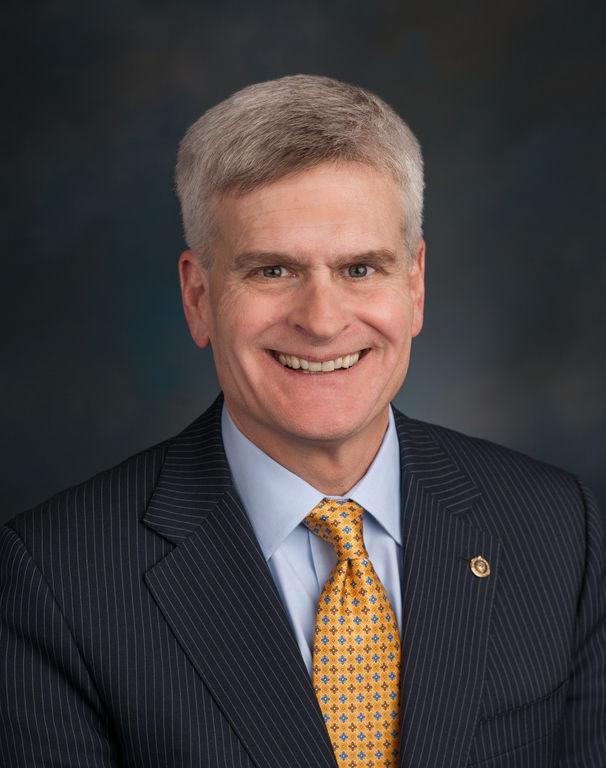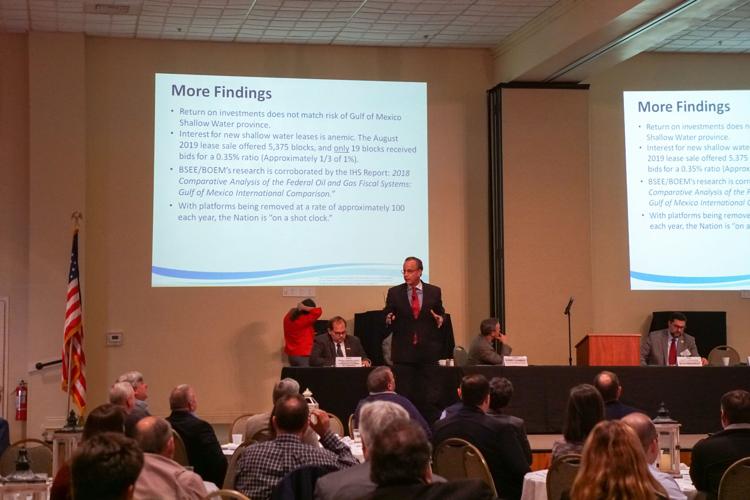
Legislation to increase Louisiana coastal restoration funds passes Senate committee
November 19, 2019
Fletcher saves students over $1 million on textbooks
November 19, 2019The South Central Industrial Association (SCIA) and the Lafourche, Thibodaux and The Houma-Terrebonne Chambers of Commerce held a joint breakfast today, featuring Bureau of Safety and Environmental Enforcement (BSEE) Director Scott Angelle as the guest speaker, at The Cypress Columns in Gray.
The room was packed this morning with local elected officials, CEOs and other leaders of various entities, listening to Angelle present a new joint research project by BSEE and the Bureau of Ocean Energy Management (BOEM).
“New research released today from the Bureau of Safety and Environmental Enforcement (BSEE) and Bureau of Ocean Energy Management (BOEM) indicates the need to define the Gulf of Mexico Shallow Water Province (water depth less than 200 meters) as a distinct province to avoid stranding more than $20 billion of the Nation’s oil and natural gas resources,” reads a press release by BOEM.
“Let me make sure I make it clear that I don’t believe that we don’t have any problems in deep water. I think we still have concerns in deep water. Today’s focus, however, is going to be on shallow water,” Angelle told the crowd this morning. “I continue to work with our partners at the Greater Lafourche Port Commission on what we might be able to do to access more capital because this business all starts with somebody willing to invest a dollar in a drill bit…They have choices today.”
Angelle went over the history of drilling in the Gulf of Mexico Shallow Water Province that’s included in the research.
According to the report, the number of wells drilled in the province has decreased 89 percent over the last 10 years and approximately 100 platforms a year are being removed with no new platforms being installed, as development has been moved onshore or to deepwater operations over the last 20 years.
The research also shows that for every million-dollar investment in shallow water, the total economic impact, including the reinvestment of state and local taxes, yields roughly $1.7 to $2 million in additional economic activity.
“The lack of development will potentially strand 179 million barrels of oil and 4,567 billion cubic feet of natural gas that have an estimated worth of $20 billion,” reads the release. “The research has laid the groundwork for two actions that encourage increased activity in the province. They include: (1) BOEM’s publication of updated discount rates for the two distinct provinces of the Gulf of Mexico; namely, the Shallow Water Province and the Deepwater Province (water depths greater than 200 meters); and (which also apply to all other OCS areas) that will be used for BSEE’s special case royalty relief evaluations; and (2) verification that BSEE has authority to consider applications for royalty relief on a ‘per project’ basis, and the projects can include exploratory wells in order to promote development of discovered resources.”
The maximum 25 percent water depth specific discount range for the Shallow Water Province, as opposed to the previous maximum of 15 percent for all of the Gulf of Mexico, will only apply to special case royalty relief applications and will only be applicable for new wells and production in the region.
“This research provides critical information that energy development in the Gulf of Mexico should not be managed with a ‘one size fits all’ approach in how we avoid stranding our nation’s valuable energy resources,” Angelle said. “Although reversing the natural decline may not be entirely possible, promoting the recovery of the remaining oil and natural gas resources in the Gulf of Mexico Shallow Water Province, while protecting the interests of the American public, is an obligation this administration is taking action on.”
“Once the infrastructure is removed, we will not be able to recover these resources,” he continued. “The nation is essentially on a ‘shot clock’ to make sure that does not happen.”






